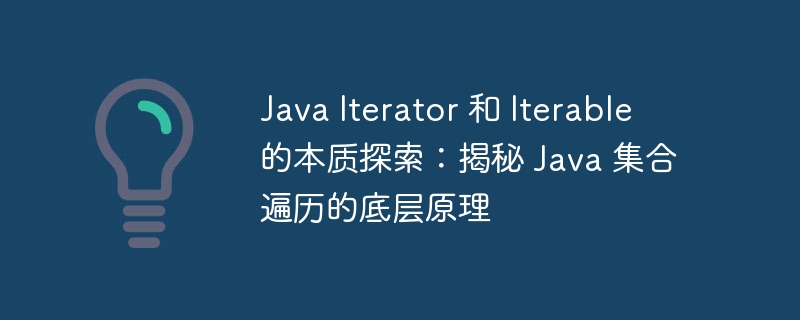 Java
Java
 javaTutorial
javaTutorial
 Exploring the essence of Java Iterator and Iterable: revealing the underlying principles of Java collection traversal
Exploring the essence of Java Iterator and Iterable: revealing the underlying principles of Java collection traversal
Exploring the essence of Java Iterator and Iterable: revealing the underlying principles of Java collection traversal

php editor Xigua Java Iterator and Iterable's essence exploration topic will deeply analyze the underlying principles of Java collection traversal. Through the discussion of Iterator and Iterable, the core mechanism of collection traversal in Java is revealed, helping readers gain a deeper understanding of the design and implementation of the Java collection framework.
List<String> names = new ArrayList<>();
names.add("Alice");
names.add("Bob");
names.add("Carol");
// 获取 Iterator 实例
Iterator<String> iterator = names.iterator();
// 遍历集合元素
while (iterator.hasNext()) {
String name = iterator.next();
System.out.println(name);
}The Iterable interface is the sister interface of Iterator. It defines the iterator() method, which is used to return an Iterator instance of the collection. The Iterable interface is more convenient to use than Iterator. When using Iterable to traverse a collection, you can directly use the for-each statement without explicitly obtaining an Iterator instance.
for (String name : names) {
System.out.println(name);
}The underlying implementation of Iterator and Iterable depends on the specific implementation of the collection type. For example, for ArrayList, its Iterator instance is actually a pointer pointing to the element in the collection. Each time the next() method is called, the pointer will be moved to The next element. For LinkedList, its Iterator instance is actually a linked list node, and each call to the next() method will move to the next linked list node.
Understanding the underlying principles of Iterator and Iterable helps us better understand how the Java collection framework works and write more efficient and robust code. This article's in-depth exploration of Iterator and Iterable can help Java programmers improve their understanding of the Java collection framework and write more elegant and efficient code.
The above is the detailed content of Exploring the essence of Java Iterator and Iterable: revealing the underlying principles of Java collection traversal. For more information, please follow other related articles on the PHP Chinese website!

Hot AI Tools

Undresser.AI Undress
AI-powered app for creating realistic nude photos

AI Clothes Remover
Online AI tool for removing clothes from photos.

Undress AI Tool
Undress images for free

Clothoff.io
AI clothes remover

AI Hentai Generator
Generate AI Hentai for free.

Hot Article

Hot Tools

Notepad++7.3.1
Easy-to-use and free code editor

SublimeText3 Chinese version
Chinese version, very easy to use

Zend Studio 13.0.1
Powerful PHP integrated development environment

Dreamweaver CS6
Visual web development tools

SublimeText3 Mac version
God-level code editing software (SublimeText3)

Hot Topics
 Top 4 JavaScript Frameworks in 2025: React, Angular, Vue, Svelte
Mar 07, 2025 pm 06:09 PM
Top 4 JavaScript Frameworks in 2025: React, Angular, Vue, Svelte
Mar 07, 2025 pm 06:09 PM
This article analyzes the top four JavaScript frameworks (React, Angular, Vue, Svelte) in 2025, comparing their performance, scalability, and future prospects. While all remain dominant due to strong communities and ecosystems, their relative popul
 How do I implement multi-level caching in Java applications using libraries like Caffeine or Guava Cache?
Mar 17, 2025 pm 05:44 PM
How do I implement multi-level caching in Java applications using libraries like Caffeine or Guava Cache?
Mar 17, 2025 pm 05:44 PM
The article discusses implementing multi-level caching in Java using Caffeine and Guava Cache to enhance application performance. It covers setup, integration, and performance benefits, along with configuration and eviction policy management best pra
 How does Java's classloading mechanism work, including different classloaders and their delegation models?
Mar 17, 2025 pm 05:35 PM
How does Java's classloading mechanism work, including different classloaders and their delegation models?
Mar 17, 2025 pm 05:35 PM
Java's classloading involves loading, linking, and initializing classes using a hierarchical system with Bootstrap, Extension, and Application classloaders. The parent delegation model ensures core classes are loaded first, affecting custom class loa
 Spring Boot SnakeYAML 2.0 CVE-2022-1471 Issue Fixed
Mar 07, 2025 pm 05:52 PM
Spring Boot SnakeYAML 2.0 CVE-2022-1471 Issue Fixed
Mar 07, 2025 pm 05:52 PM
This article addresses the CVE-2022-1471 vulnerability in SnakeYAML, a critical flaw allowing remote code execution. It details how upgrading Spring Boot applications to SnakeYAML 1.33 or later mitigates this risk, emphasizing that dependency updat
 Node.js 20: Key Performance Boosts and New Features
Mar 07, 2025 pm 06:12 PM
Node.js 20: Key Performance Boosts and New Features
Mar 07, 2025 pm 06:12 PM
Node.js 20 significantly enhances performance via V8 engine improvements, notably faster garbage collection and I/O. New features include better WebAssembly support and refined debugging tools, boosting developer productivity and application speed.
 Iceberg: The Future of Data Lake Tables
Mar 07, 2025 pm 06:31 PM
Iceberg: The Future of Data Lake Tables
Mar 07, 2025 pm 06:31 PM
Iceberg, an open table format for large analytical datasets, improves data lake performance and scalability. It addresses limitations of Parquet/ORC through internal metadata management, enabling efficient schema evolution, time travel, concurrent w
 How can I implement functional programming techniques in Java?
Mar 11, 2025 pm 05:51 PM
How can I implement functional programming techniques in Java?
Mar 11, 2025 pm 05:51 PM
This article explores integrating functional programming into Java using lambda expressions, Streams API, method references, and Optional. It highlights benefits like improved code readability and maintainability through conciseness and immutability
 How to Share Data Between Steps in Cucumber
Mar 07, 2025 pm 05:55 PM
How to Share Data Between Steps in Cucumber
Mar 07, 2025 pm 05:55 PM
This article explores methods for sharing data between Cucumber steps, comparing scenario context, global variables, argument passing, and data structures. It emphasizes best practices for maintainability, including concise context use, descriptive





